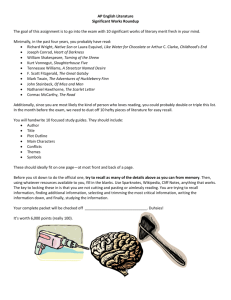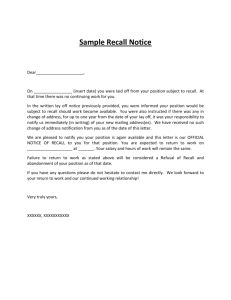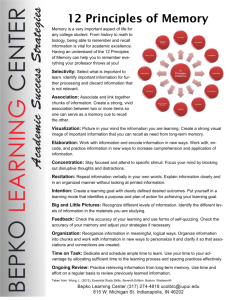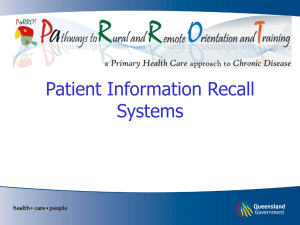The cue-dependent theory of forgetting (Tulving, 1975)
advertisement
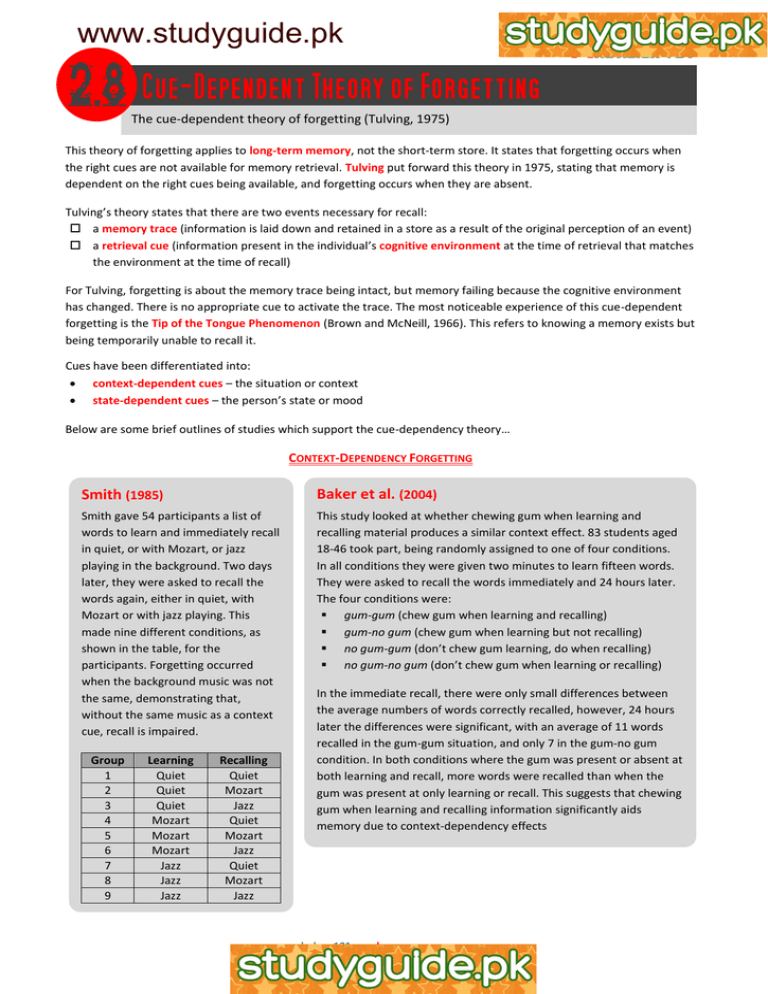
www.studyguide.pk The cue-dependent theory of forgetting (Tulving, 1975) This theory of forgetting applies to long-term memory, not the short-term store. It states that forgetting occurs when the right cues are not available for memory retrieval. Tulving put forward this theory in 1975, stating that memory is dependent on the right cues being available, and forgetting occurs when they are absent. Tulving’s theory states that there are two events necessary for recall: a memory trace (information is laid down and retained in a store as a result of the original perception of an event) a retrieval cue (information present in the individual’s cognitive environment at the time of retrieval that matches the environment at the time of recall) For Tulving, forgetting is about the memory trace being intact, but memory failing because the cognitive environment has changed. There is no appropriate cue to activate the trace. The most noticeable experience of this cue-dependent forgetting is the Tip of the Tongue Phenomenon (Brown and McNeill, 1966). This refers to knowing a memory exists but being temporarily unable to recall it. Cues have been differentiated into: context-dependent cues – the situation or context state-dependent cues – the person’s state or mood Below are some brief outlines of studies which support the cue-dependency theory… CONTEXT-DEPENDENCY FORGETTING Smith (1985) Baker et al. (2004) Smith gave 54 participants a list of words to learn and immediately recall in quiet, or with Mozart, or jazz playing in the background. Two days later, they were asked to recall the words again, either in quiet, with Mozart or with jazz playing. This made nine different conditions, as shown in the table, for the participants. Forgetting occurred when the background music was not the same, demonstrating that, without the same music as a context cue, recall is impaired. This study looked at whether chewing gum when learning and recalling material produces a similar context effect. 83 students aged 18-46 took part, being randomly assigned to one of four conditions. In all conditions they were given two minutes to learn fifteen words. They were asked to recall the words immediately and 24 hours later. The four conditions were: gum-gum (chew gum when learning and recalling) gum-no gum (chew gum when learning but not recalling) no gum-gum (don’t chew gum learning, do when recalling) no gum-no gum (don’t chew gum when learning or recalling) Group 1 2 3 4 5 6 7 8 9 Learning Quiet Quiet Quiet Mozart Mozart Mozart Jazz Jazz Jazz Recalling Quiet Mozart Jazz Quiet Mozart Jazz Quiet Mozart Jazz In the immediate recall, there were only small differences between the average numbers of words correctly recalled, however, 24 hours later the differences were significant, with an average of 11 words recalled in the gum-gum situation, and only 7 in the gum-no gum condition. In both conditions where the gum was present or absent at both learning and recall, more words were recalled than when the gum was present at only learning or recall. This suggests that chewing gum when learning and recalling information significantly aids memory due to context-dependency effects www.aspsychology101.wordpress.com www.studyguide.pk STATE-DEPENDENCY FORGETTING Lang et al. (2001) This investigated the role of emotion as a state cue by inducing fear. 54 students who were fearful of snakes and spiders had their fear induced again whilst learning a list of words. They found that when the fear was induced for recall, the scared students were able to recall more learnt words than when they were in a relaxed state. Experimental research seems to support anecdotal evidence that places, objects, smells and emotions can all be triggers to aid recall, but without these cues present we are liable to experience difficulty remembering Miles and Hardman (1998) Miles and Hardman used aerobic exercise to produce a physiological state in order to test state-dependent recall. 24 undergraduates were required to learn a list of three syllable words whilst on an exercise bicycle. All participants repeated four combinations of learning and recall whilst pedalling or resting. They concluded that aerobic exercise did have a significant positive effect on recall when used as a state cue EVALUATION OF CUE-DEPENDENCY THEORY The theory is supported by much anecdotal evidence (personal experiences – most people have experienced the “Tip of the Tongue Phenomenon” where you cannot quite recall what you know exists). There is also a great deal of experimental evidence (provided by studies) which support the theory. A further strength is that the theory has practical applications, which are related to cognition and improving memory and ability to recall information. Also, the theory can be tested, unlike theories such as trace-decay theory. Experiments can test the importance of cues as they are tangible and measurable, unlike memory traces. However, one major weakness is that the tasks from all studies supporting the theory are artificial: most often learning words lists. Also, it is only an explanation for forgetting from long-term memory, it does not include anything about the short-term store. The theory may not be a complete explanation either, as it cannot explain why emotionally-charged memories can be really vivid – even without a cue (such as posttraumatic stress disorder or PTSD). It is also hard to prove whether a memory has been revived from the cue or from the memory trace simply being activated, therefore it makes the theory hard to refute. www.aspsychology101.wordpress.com

